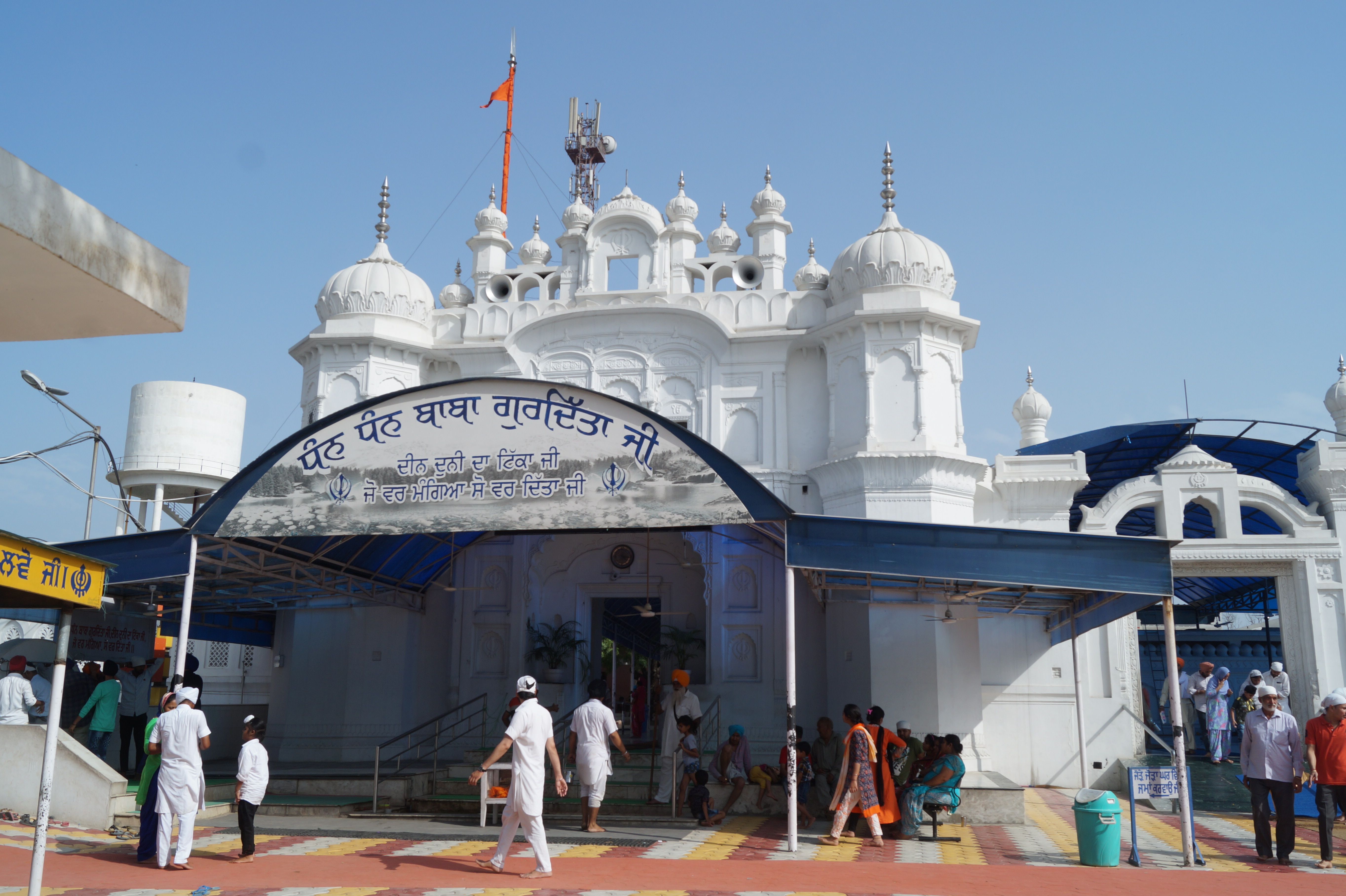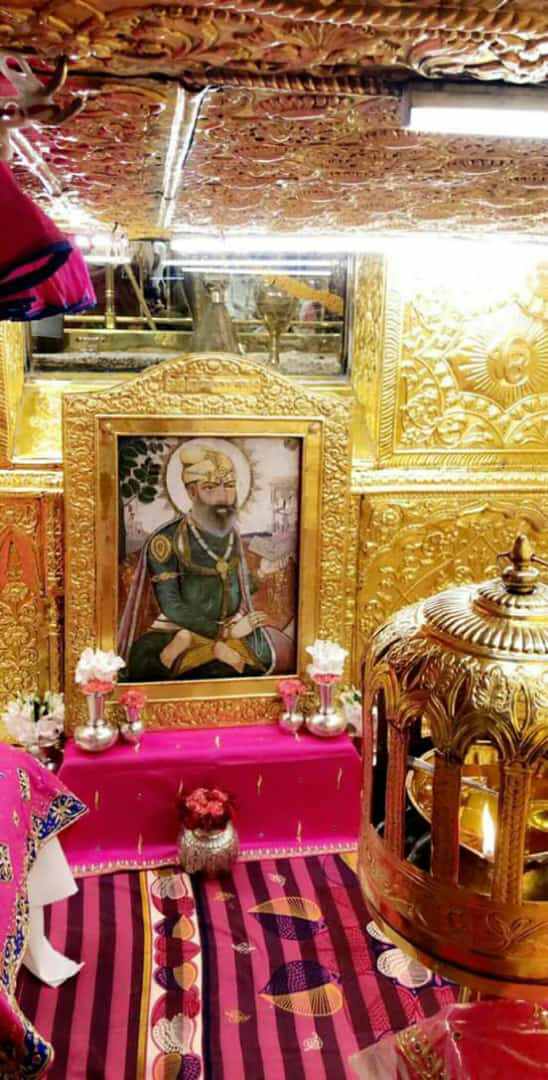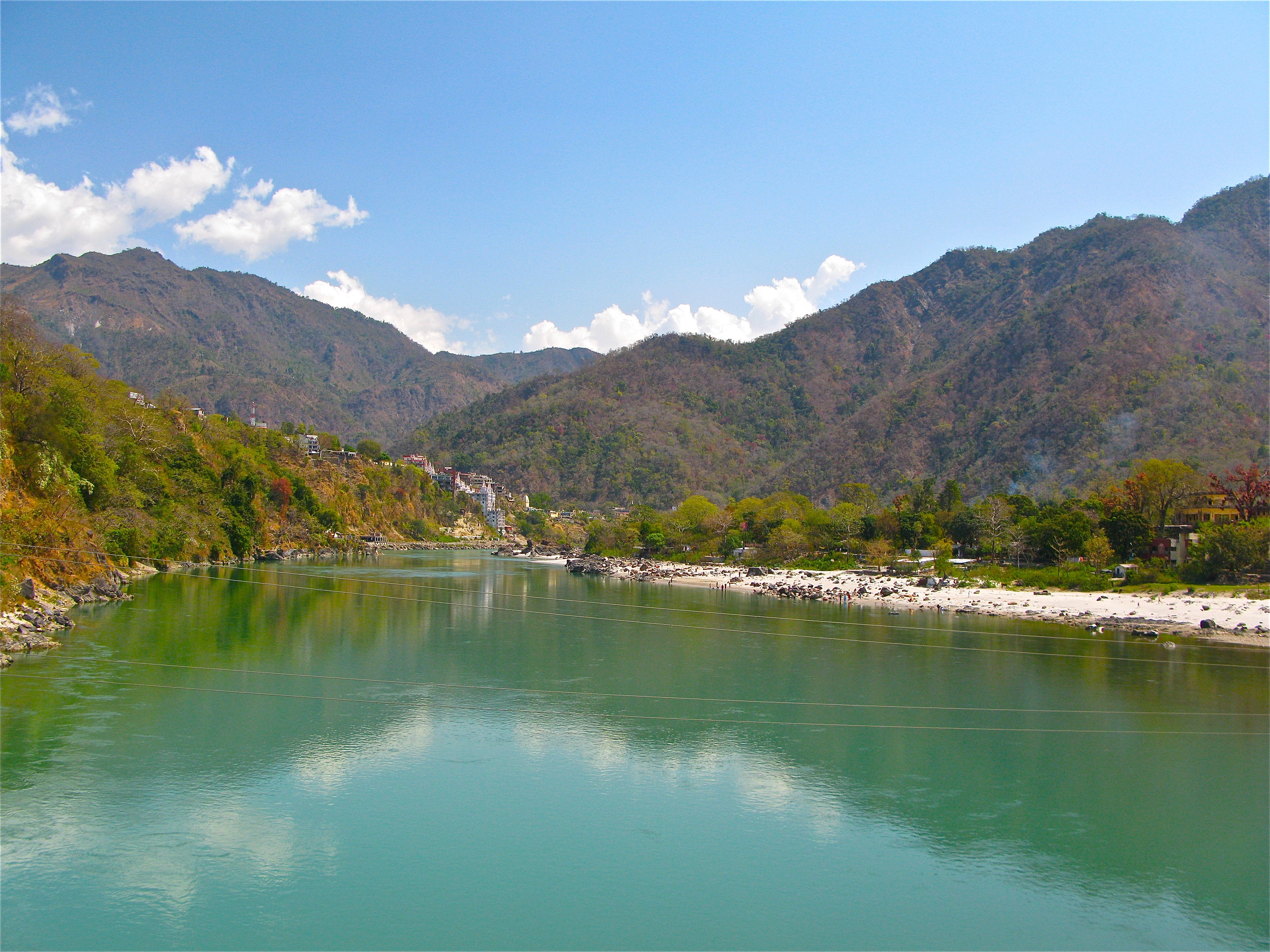|
Baba Gurditta
Baba Gurditta (5 November 1613–15 March 1638, Gurmukhi: ਗੁਰਦਿੱਤਾ) was the son of Guru Hargobind (sixth Sikh guru), and the father of Guru Har Rai (seventh Sikh guru) of Sikhism. There is a gurudwara in Kiratpur Sahib, Punjab which is in remembrance of Baba Gurditta. During the years of 1626–1627, he lived in Kartarpur in the Jalandhar district as per directions by his father. He was the founder of Kiratpur near the Shivalik foothills, also according to commands by his father. He took part in the Battle of Kartarpur (1635) against Painde Khan. Baba Gurditta died around 1638, while his father was still alive. His brother Guru Tegh Bahadur would later become the ninth Sikh guru when Baba Gurdita's line of succession dried up. After the Battle of Kartarpur, he took rest under a Banyan tree which is still there in Kartarpur near Sukka Talab he tied his horses under the tree. The sacred Banyan tree has great significance for the Sikhs of Kartarpur. The site is ... [...More Info...] [...Related Items...] OR: [Wikipedia] [Google] [Baidu] |
Gurudwara Baba Gurditta
Gurudwara Baba Gurditta Ji is a Sikh temple (''gurdwara'') in the village of Chandpur Rurki of Nawanshahr District in Indian Punjab. The gurudwara is situated at the entrance of the village and about 1.5 km from Garhshankar-Anandpur Sahib link highway. It was built in memory of Baba Gurditta and Baba Kesra Singh Ji. Famous visitors Gurudwara Baba Gurditta Ji is a historical and holy place for Sikhism. Baba Gurditta Ji visited Chandpur Rurki with two associates. They stayed one night along with their horse. This Gurudwara has two Samadhis for two associates, held in main Gurudwara Sahib Ji. Herein Baba Ji traveled on horseback along with two associates, and took rest here. The chain with which they tied their horse is still visible in Gurudwara Sahib. Events and celebrations All events, functions and ceremonies that take place at the Gurudwara have always been started with remembrances to Baba Gurditta Ji. A phrase frequently used there is "Dhan-Dhan Baba Gurditta ji, De ... [...More Info...] [...Related Items...] OR: [Wikipedia] [Google] [Baidu] |
Sikhism
Sikhism (), also known as Sikhi ( pa, ਸਿੱਖੀ ', , from pa, ਸਿੱਖ, lit=disciple', 'seeker', or 'learner, translit=Sikh, label=none),''Sikhism'' (commonly known as ''Sikhī'') originated from the word ''Sikh'', which comes from the Sanskrit root ' meaning "disciple", or ' meaning "instruction". Singh, Khushwant. 2006. ''The Illustrated History of the Sikhs''. Oxford University Press. . p. 15.Kosh, Gur Shabad Ratnakar Mahan. https://web.archive.org/web/20050318143533/http://www.ik13.com/online_library.htm is an Indian religion that originated in the Punjab region of the Indian subcontinent,"Hinduism, Buddhism, Jainism and Sikh originated in India." around the end of the 15th century CE. It is the most recently founded major organized faith and stands at fifth-largest worldwide, with about 25–30 million adherents (known as Sikhs) .McLeod, William Hewat. 2019 998 Sikhism developed from the spiritual teachings of Guru Nanak (1469–1539), the faith's first gu ... [...More Info...] [...Related Items...] OR: [Wikipedia] [Google] [Baidu] |
Battle Of Kartarpur
The Battle of Kartarpur occurred on 25 April 1635 It started when the Mughal Empire attacked the town of Kartarpur, and was the last major battle of the Mughal-Sikh Wars during Guru Hargobind's period of Guruship.The Mughal force was repulsed by the Sikh defenders. Events Painda (or Painde) Khan, ex-general of the Sikh troops, convinced Shah Jahan to send a force against Guru Hargobind in Kartarpur. The expedition was commanded by Kale Khan, the governor of Peshwar. Assisted by Khans Qutub (Qutab or Kutub, the faujdar of Jalandhar) and Painda. Painda was accompanied by his son-in-law, Asman Khan. Qutub sent Anwar Khan with gifts to Guru Hargobind which were rejected. Anwar challenged Hargobind to a game of chaupar. After being defeated, Anwar insulted the Guru's predecessors, and in return was beaten and sent away. Kartarpur was defended by Bhai Bidhi Chand with Guru Hargobind and his eldest son Baba Gurdita supporting him. According to historian Max Macauliffe, Hargobin ... [...More Info...] [...Related Items...] OR: [Wikipedia] [Google] [Baidu] |
Family Members Of The Sikh Gurus
Family (from la, familia) is a group of people related either by consanguinity (by recognized birth) or affinity (by marriage or other relationship). The purpose of the family is to maintain the well-being of its members and of society. Ideally, families offer predictability, structure, and safety as members mature and learn to participate in the community. Historically, most human societies use family as the primary locus of attachment, nurturance, and socialization. Anthropologists classify most family organizations as matrifocal (a mother and her children), patrifocal (a father and his children), conjugal (a wife, her husband, and children, also called the nuclear family), avuncular (a man, his sister, and her children), or extended (in addition to parents and children, may include grandparents, aunts, uncles, or cousins). The field of genealogy aims to trace family lineages through history. The family is also an important economic unit studied in family economics. The w ... [...More Info...] [...Related Items...] OR: [Wikipedia] [Google] [Baidu] |
Punjabi People
The Punjabis ( Punjabi: ; ਪੰਜਾਬੀ ; romanised as Panjābīs), are an Indo-Aryan ethnolinguistic group associated with the Punjab region of the Indian subcontinent, comprising areas of eastern Pakistan and northwestern India. They generally speak Standard Punjabi or various Punjabi dialects on both sides. The ethnonym is derived from the term ''Punjab'' (Five rivers) in Persian to describe the geographic region of the northwestern part of the Indian subcontinent, where five rivers Beas, Chenab, Jhelum, Ravi, and Sutlej merge into the Indus River, in addition of the now-vanished Ghaggar. The coalescence of the various tribes, castes and the inhabitants of the Punjab region into a broader common "Punjabi" identity initiated from the onset of the 18th century CE. Historically, the Punjabi people were a heterogeneous group and were subdivided into a number of clans called '' biradari'' (literally meaning "brotherhood") or ''tribes'', with each person bound to a cl ... [...More Info...] [...Related Items...] OR: [Wikipedia] [Google] [Baidu] |
Udasi
Udasi (Gurmukhi: ਉਦਾਸੀ ਸੰਪਰਦਾ; ''udāsī saparadā'') is a religious sect of ascetic ''sadhus'' centred in northern India. Becoming custodians of Sikh shrines in the 18th century, they were notable interpreters and spreaders of the Sikh philosophy during that time. However, their religious practices border on a syncretism of Sikhism and Hinduism, including idolatry, and they did not conform to the Khalsa standards as ordained by Guru Gobind Singh. When the Lahore Singh Sabha reformers, dominated by Tat Khalsa Sikhs, would hold them responsible for indulging in ritual practices antithetical to Sikhism, as well as personal vices and corruption, the Udasi mahants were expelled from the Sikh shrines. Etymology Udasi is derived from the Sanskrit word ''Udāsīn'', which means one who is indifferent to or disregardful of worldly attachments, a stoic, or a mendicant. The word ''Udasi'' is derived from the Sanskrit word , meaning 'detached, journey', reflecting a ... [...More Info...] [...Related Items...] OR: [Wikipedia] [Google] [Baidu] |
Nihang
The Nihang or Akali (lit. "the immortals") is an armed Sikh warrior order originating in the Indian subcontinent. Nihang are believed to have originated either from Fateh Singh and the attire he wore or from the "Akali" (lit. Army of the Immortal) started by Guru Hargobind. Early Sikh military history was dominated by the Nihang, known for their victories where they were heavily outnumbered. Traditionally known for their bravery and ruthlessness in the battlefield, the Nihang once formed the irregular guerrilla squads of the armed forces of the Sikh Empire, the Sikh Khalsa Army. Akali The ''word Akali/akaali'' means timeless or immortal. Literally, one who belongs to ''Akaal'' (beyond Time). In other words, an Akaali is that person who is subject of none but God only. Conceptually speaking, the terms Akaali, Khalsa and Sikh are synonymous. The term Akaali was first used during the time of Guru Gobind Singh Sahib. The term Akaali became popular in the last decades of the eig ... [...More Info...] [...Related Items...] OR: [Wikipedia] [Google] [Baidu] |
Guru Tegh Bahadur
Guru Tegh Bahadur ( Punjabi: ਗੁਰੂ ਤੇਗ਼ ਬਹਾਦਰ (Gurmukhi); ; 1 April 1621 – 11 November 1675) was the ninth of ten Gurus who founded the Sikh religion and the leader of Sikhs from 1665 until his beheading in 1675. He was born in Amritsar, Punjab, India in 1621 and was the youngest son of Guru Hargobind, the sixth Sikh guru. Considered a principled and fearless warrior, he was a learned spiritual scholar and a poet whose 115 hymns are included in ''Sri Guru Granth Sahib,'' the main text of Sikhism. Guru Tegh Bahadur was executed on the orders of Aurangzeb, the sixth Mughal emperor, in Delhi, India.;;; Sikh holy premises Gurudwara Sis Ganj Sahib and Gurdwara Rakab Ganj Sahib in Delhi mark the places of execution and cremation of Guru Tegh Bahadur. His martyrdom is remembered as the ''Shaheedi Divas of Guru Tegh Bahadur'' every year on 24 November. Biography Early life Guru Tegh Bahadur was the youngest son of Guru Hargobind, the sixth guru: Guru ... [...More Info...] [...Related Items...] OR: [Wikipedia] [Google] [Baidu] |
Sivalik Hills
The Sivalik Hills, also known as the Shivalik Hills and Churia Hills, are a mountain range of the outer Himalayas that stretches over about from the Indus River eastwards close to the Brahmaputra River, spanning the northern parts of the Indian subcontinent. It is wide with an average elevation of . Between the Teesta and Raidāk Rivers in Assam is a gap of about . "Sivalik" literally means 'tresses of Shiva'. Sivalik region is home to the Soanian archaeological culture. Geology Geologically, the Sivalik Hills belong to the Tertiary deposits of the outer Himalayas. They are chiefly composed of sandstone and conglomerate rock formations, which are the solidified detritus of the Himalayas to their north; they are poorly consolidated. The remnant magnetisation of siltstones and sandstones indicates that they were deposited 16–5.2 million years ago. In Nepal, the Karnali River exposes the oldest part of the Shivalik Hills. They are bounded on the south by a fault syst ... [...More Info...] [...Related Items...] OR: [Wikipedia] [Google] [Baidu] |
Mata Nihal Kaur
Mata Nihal Kaur (died 29 September 1644), popularly known as Mata Natti, also known as Ananti, Nihalo, and Bassi, was the wife of Baba Gurditta. Biography She was the daughter of father Bhai Rama and mother Sukhdevi, both of whom were Khatri Sikhs from the locality of Batala located in present-day Gurdaspur district. She was wed to Baba Gurditta on 17 April 1624. Nihal Kaur was the daughter-in-law of the sixth Sikh Guru, Guru Hargobind. She bore two sons, Dhir Mal (born 11 January 1627) and the seventh Sikh Guru, Guru Har Rai (born 18 January 1630). When Guru Hargobind passed and Mata Nanaki relocated to Bakala in 1644, Nihal Kaur was the head of the Guru's household during the Guruship periods of Har Rai and Har Krishan. She was responsible for the upbringing of the seventh Guru and infused the spiritual values of the House of Guru Nanak, the founder of Sikhism Sikhism (), also known as Sikhi ( pa, ਸਿੱਖੀ ', , from pa, ਸਿੱਖ, lit=disciple', 'seeke ... [...More Info...] [...Related Items...] OR: [Wikipedia] [Google] [Baidu] |
Kiratpur Sahib
Kiratpur also known as Kiratpur Sahib is a town in Rupnagar district, Punjab, India. The town is the location of the Gurdwara Patal Puri where many Sikhs take ashes of their deceased. Kiratpur Sahib Town Kiratpur Sahib (31.1820758°n 76.5635490°e) was established in 1627 by the 6th Sikh Guru, Guru Hargobind, who bought the land from Raja Tara Chand of Kehlur through his son, Baba Gurditta. The place is also associated with the memory of a Muslim saint, Pir Buddan Shah. It is situated on the bank of the Sutlej about 10 km south of Anandpur, about 30 km north of Rupnagar and 90 km from Chandigarh on the Nangal-Rupnagar-Chandigarh road (NH21). It is a sacred place for the Sikhs. Guru Nanak Dev is said to have visited this place when it was little more than a wilderness. Guru Hargobind, the sixth Guru spent the last few years of his life here. Both Guru Har Rai and Guru Harkrishan were also born at this place and they received the Gurgadi (Guruship) at this pl ... [...More Info...] [...Related Items...] OR: [Wikipedia] [Google] [Baidu] |
Jalandhar District
Jalandhar district is a district in Doaba region of the state of Punjab, India. District headquarters is Jalandhar city. Before the Partition of India, Jalandhar was also the headquarters of the Jalandhar Division, with constituent districts Jalandhar, Hoshiarpur, Ludhiana, Ferozepur and Kangra. The entire Jalandhar Division was awarded to India when Punjab was partitioned. History Classical Jalandhar was the site of the Katoch Rajput kingdom of Jalandhara, also known as Trigartta. The date of its founding is unclear, but its presence is observed by the Chinese pilgrim Xuanzang in the seventh century, and Kalhana records the defeat of Prithvi Chandra Raja of Trigartta by Sankara Varmma of Kashmir towards the end of the ninth century.Government of Punjab, Punjab District Gazetteers, Volume XIV A. Jullundur District, with maps, 1904, Lahore, Civil and Military Gazette Press, 1908 Medieval Jalandhar became part of the Persianate Ghaznavid Empire during the reign of Ibrahim Shah ... [...More Info...] [...Related Items...] OR: [Wikipedia] [Google] [Baidu] |







